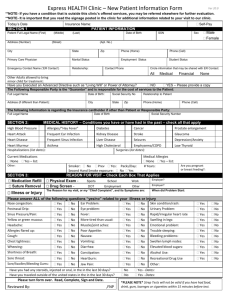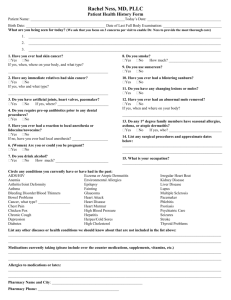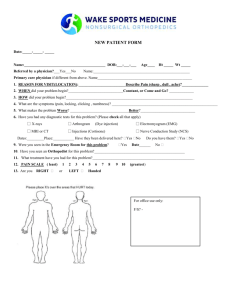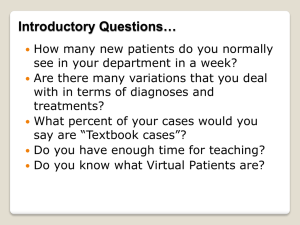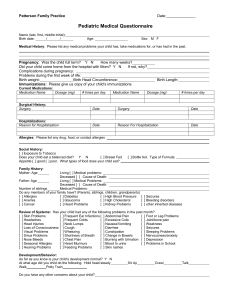Pregnancy and Lactation Case Studies 2013
advertisement
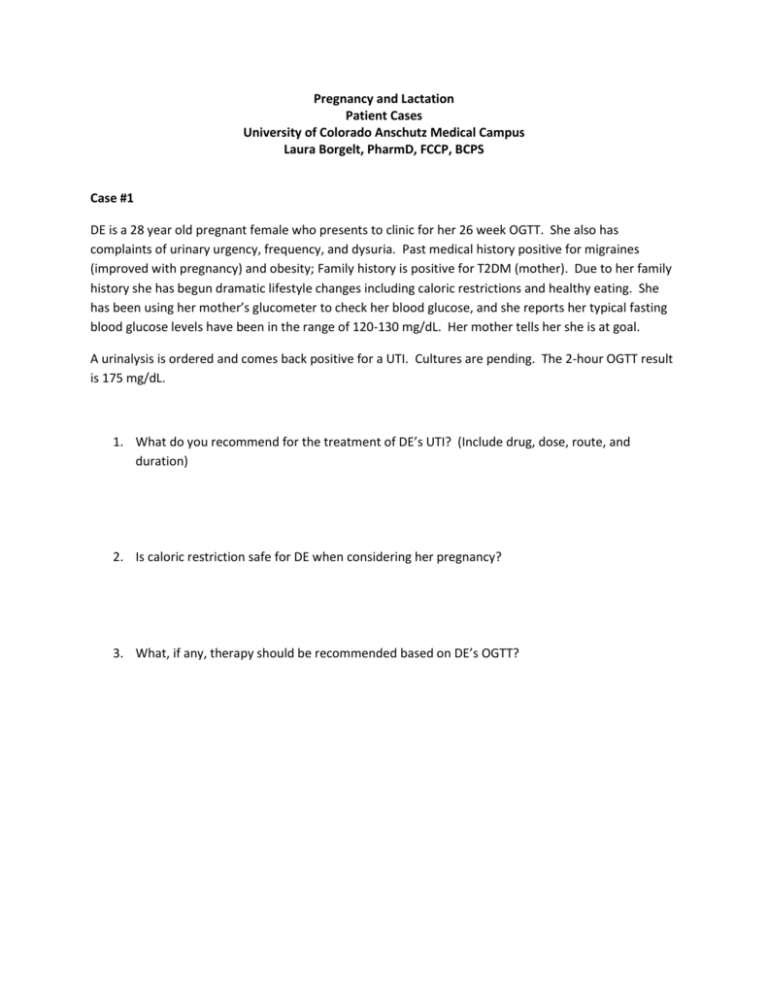
Pregnancy and Lactation Patient Cases University of Colorado Anschutz Medical Campus Laura Borgelt, PharmD, FCCP, BCPS Case #1 DE is a 28 year old pregnant female who presents to clinic for her 26 week OGTT. She also has complaints of urinary urgency, frequency, and dysuria. Past medical history positive for migraines (improved with pregnancy) and obesity; Family history is positive for T2DM (mother). Due to her family history she has begun dramatic lifestyle changes including caloric restrictions and healthy eating. She has been using her mother’s glucometer to check her blood glucose, and she reports her typical fasting blood glucose levels have been in the range of 120-130 mg/dL. Her mother tells her she is at goal. A urinalysis is ordered and comes back positive for a UTI. Cultures are pending. The 2-hour OGTT result is 175 mg/dL. 1. What do you recommend for the treatment of DE’s UTI? (Include drug, dose, route, and duration) 2. Is caloric restriction safe for DE when considering her pregnancy? 3. What, if any, therapy should be recommended based on DE’s OGTT? Case #2 TM is a 31 year old female who is 24 weeks gestation. She presents to clinic with complaints of sore throat, nasal congestion, and headache for the past three days. She has not tried any medications for symptom relief but has Sudafed at home and wants to know if she can take it. She has been drinking plenty of water and uses a humidifier. Patient has no significant PMH and no known drug allergies. At previous visit on 9/27/13, BP was elevated at 158/79; urine protein negative. Patient was instructed to implement a sodium-restricted diet and reports compliance. Vital signs are as follows: 10/4/13 BP: 156/92 HR: 95 Temp: 97.7°F RR:18 All other labs from 10/28 are within normal limits. 1. Should the patient be advised to take Sudafed? If yes, what dose? 2. Would you recommend any other treatment options for symptom relief? If yes, what? 3. Please provide your recommendations concerning the patient’s recent blood pressure elevations. Case #3 TI is a 29 year old female who is 3 weeks postpartum. She comes to the clinic with complaints of breast tenderness, warmth, and redness that have developed over the last several days. She also complains of fatigue and has been febrile for the last 24 hours. Upon further questioning, she also admits to “feeling down” over the last couple of weeks. This is TI’s first experience with breastfeeding, and she is hesitant to continue, as she reports it to be quite uncomfortable and painful over the last few days. After PCP evaluation, TI is diagnosed with mastitis and postpartum depression. 1. What recommendations do you have for treatment of TI’s mastitis? 2. Should she continue to breastfeed? 3. The medical resident who is seeing TI in clinic asks for your recommendations regarding the treatment of her postpartum depression. What do you suggest? Case #4 GR is a 35 year old female who presents to clinic today with complaints of swelling, redness, and pain in her left lower extremity. Of note, she is currently 28 weeks pregnant. Her PMH is also significant for asthma and seasonal allergies. Doppler imaging confirms the presence of a DVT in the great saphenous vein. Upon reviewing GR’s medication list, the medical resident also discovers that she is using her albuterol inhaler 4-5 times per week. She is not currently using loratadine. Medications: Albuterol 1-2 puffs every 4 hours prn shortness of breath or wheezing Loratadine 10 mg daily prn seasonal allergies Folic acid 1 mg once daily GR needs to be started on anticoagulation for treatment of her DVT. What treatment would you recommend? Is there any monitoring involved with your treatment regimen? Does GR need any modifications to her asthma therapy? Please provide specific drug therapies if modifications are recommended. Case #5 TM is a 31 year old female with a history of partial seizures. She is well controlled on monotherapy with oxcarbazepine. Her last breakthrough seizure was approximately two years ago. She presents to clinic today for a routine physical. During her exam, she reports that she and her husband are hoping to conceive within the next year. She has no other pertinent PMH except for some occasional heartburn and no known drug allergies. Vitals: BP: 128/76 HR:85 O2:97% RR:16 All labs today are within normal limits. Knowing that TM would like to become pregnant in the near future, what recommendations do you have regarding her epilepsy management? TM presents to the clinic again 10 months later and is now 34 weeks gestation. She now has complaints of headaches which she describes as throbbing and unilateral. She reports experiencing these headaches twice weekly for the last month and is wondering if there are any medications she may take for her symptoms. What medications, if any, would you recommend for symptom management of her headaches? Are there any medications she should avoid at this point in her pregnancy?
